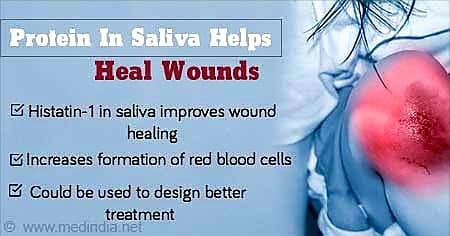 |
| Medindia.net |
When injured, animals such as dogs or cats will usually lick the wound until it heals. Animal saliva does contain antiseptic compounds that can kill bacteria.
Then what about human saliva? Compared to wounds on the skin or bones, sores inside the mouth tend to heal faster. However, does this mean that human saliva can also heal wounds?
The effect of saliva to heal wounds
The following are some of the findings in studies examining the effect of human saliva content on wound care.
1. Saliva can prevent wound infection
Animal saliva contains epidermal growth factor (EGF) and nerve growth factor (NGF) which play an important role in wound healing.
This active component is not found in human saliva. However, human saliva contains histatins which are antimicrobial so they can prevent infection.
This is explained in a study published in the journal PLOS Pathogens.
The study states that histatins in saliva are peptides, which are protein-forming substances that are only produced by the salivary glands of humans and primates.
This substance has the ability to counteract the activity of microorganisms that cause infection such as the fungus Candida albicans.
In addition to histatins, there are other types of peptides found in human saliva that are also antimicrobial, namely defensins, cathelicidins, and statrins.
This type of peptide in saliva plays an important role in healing wounds around the mouth.
2. Saliva heals wounds faster
According to a 2012 study conducted by Jia J., Sun Y., Yang H., et al, histatins in saliva apparently play a role in the wound healing process.
This research was conducted on adult rabbits that had scratches of 2.5 x 2.5 centimeters (cm) on their backs.
Researchers divided the rabbits into 3 different groups to see the effectiveness of the substance histatin in healing wounds.
The first group was given salt water, the second group was given yunnan baiyao powder (a powder that has been widely used to heal wounds), and the third group was given saliva.
The results of this study in the group that was given saliva and Yunnan Baiyao showed that wounds healed faster than those given salt water.
In saliva-treated wounds, the healing rate was even faster on the 5th, 8th, and 11th days.
In addition, this type of wound heals with better results without significant swelling or cell damage.
The wounds even re-covered with new skin after 15 days which is faster than the other two groups.
Researchers say there is hope if the histatin content in saliva can heal wounds in people with diabetes and various other types of wounds that are difficult to heal.
3. Saliva helps wound recovery
A 2017 study from the FASEB Journal showed that histatins in saliva can trigger the process of angiogenesis, or blood vessel formation.
This is beneficial in the wound healing process. The study carried out experiments on injured endothelial tissue (part of blood vessels), in cell culture medium and chicken embryo tissue.
Histatin is then dripped on the tissue from saliva to see its healing effect on the wound.
The results showed that histatin helps the formation of new blood vessel network in damaged tissue.
Similar experiments were also carried out in a recent study released by Tissue Engineering and Regenerative Medicine.
In this experiment, researchers used skin tissue with inflammatory wounds as a research model.
In conclusion, the researchers explained that the content in human saliva has the potential to heal wounds.
This is because histatins can stimulate wound closure in both the mouth and the skin, especially those caused by inflammation.
So, is it okay to clean the wound with saliva?
Although several studies have shown the potential of saliva's active ingredients in wound healing, experts do not recommend applying saliva directly to wounds.
Research with positive results does not mean you can clean the wound with saliva.
It is intended that histatin in saliva can be used in the manufacture of medicines to heal wounds.
According to experts, human saliva also contains many bacteria that can trigger infection in wounds, especially in open wounds that are deep enough.
Bacteria in saliva may not be harmful when in the mouth. However, when on the skin, bacteria can directly infect.
Well, infection in this wound actually slows wound healing, even at high risk of causing tissue damage.
When injured, the right first aid step is to clean the wound using running water and soap.
But first, make sure the external bleeding has stopped when you want to clean the wound.
It is important to know that the animal's habit of licking the wound is not always good for wound healing. The reason is exactly the same as for humans that there is a risk of infection from the bacterial content present in animal saliva.
Therefore, avoid cleaning the wound with saliva. If you have trouble stopping the bleeding and the wound is already contaminated with hard-to-clean feces, seek medical attention immediately.













0 Comments